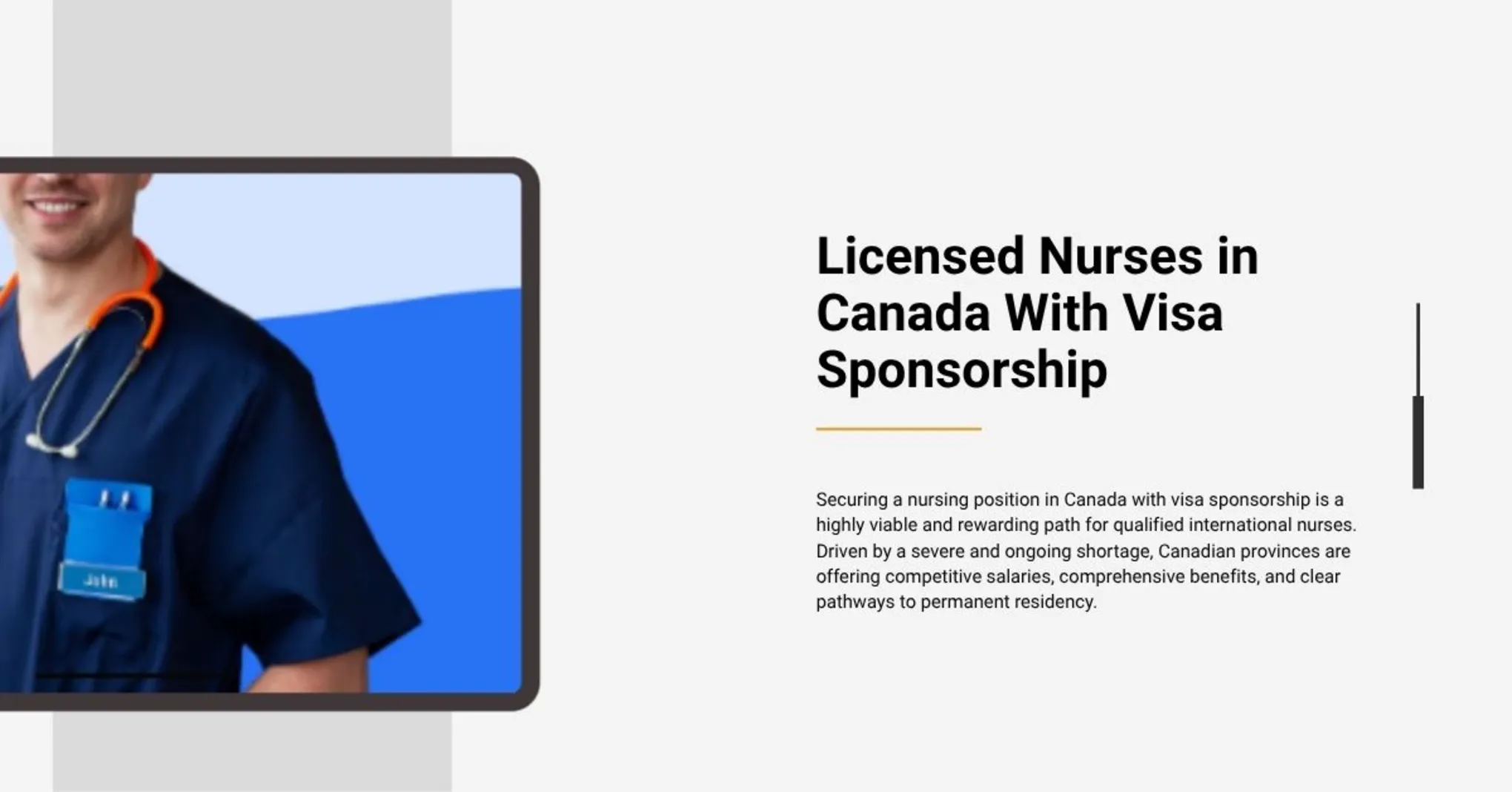Picture a career where your healing touch is not only valued but celebrated a chance to build a secure, prosperous life in a country that urgently needs your skills.
Canada’s healthcare system is actively welcoming internationally trained nurses, offering full visa sponsorship, competitive salaries of $38–$60/hour for RNs, a direct pathway to permanent residency, and comprehensive benefits from coast to coast.
If you’re a dedicated RN, LPN, or RPN ready to make a lasting impact while securing your family’s future, Canada is calling your name.
Why Canada Needs International Nurses in 2026
Canada’s aging population, hospital expansion, and long-term care growth have created a persistent nursing shortage. According to provincial workforce planning data, thousands of nursing vacancies remain unfilled annually especially in hospitals, long-term care homes, mental health facilities, and community health centers.
To address this gap, Canada has streamlined:
- Immigration pathways for healthcare workers
- Employer-sponsored work permits
- Provincial Nominee Programs (PNPs) targeting nurses
Details of Licensed Nurses in Canada With Visa Sponsorship
Key Points
- Job Titles: Registered Nurse (RN), Licensed Practical Nurse (LPN), Registered Psychiatric Nurse (RPN)*
*Note: RPN is a distinct title used primarily in Western Canada; in Ontario, “RPN” refers to a Registered Practical Nurse, which is equivalent to an LPN. - High-Demand Provinces: Ontario, British Columbia, Alberta, Nova Scotia, and Manitoba.
- Employment Type: Primarily Full-Time, Permanent.
- Visa Sponsorship: Available through various immigration programs.
Salary Expectations
Salaries vary by province, experience, and specialization. The following are realistic average hourly ranges.
| Role | Typical Experience | Average Hourly Rate (CAD) | Estimated Annual Salary (Full-Time) |
|---|---|---|---|
| Licensed Practical Nurse (LPN) | 1-3 years | $30 – $38 | $62,400 – $79,000 |
| Registered Nurse (RN) | 1-5 years | $38 – $50 | $79,000 – $104,000 |
| Specialized/Senior RN | 5+ years | $50 – $60+ | $104,000 – $125,000+ |
Note: Wages are typically higher in northern and remote communities.
Primary Immigration Pathways
- Express Entry (Federal Skilled Worker Program): A points-based system. Having a valid job offer provides significant points, but highly qualified nurses with strong language skills may qualify without one.
- Provincial Nominee Program (PNP): Many provinces have specific streams targeting nurses. A provincial nomination gives you a massive boost in the Express Entry system. Examples include Ontario’s Human Capital Priorities Stream and BC’s Healthcare Professional Stream.
- Temporary Work Permit: Often the first step. An employer may sponsor you for a closed work permit after obtaining a Positive Labour Market Impact Assessment (LMIA), proving no Canadian was available for the role.
Benefits of Working as a Nurse in Canada
- Pathway to Permanent Residency: Nursing is a prioritized occupation.
- Competitive Salary & Benefits: Including comprehensive health insurance, pension plans, and paid time off.
- Professional Development: Opportunities for continuous learning and specialization.
- Safe & Structured Work Environment: Strong labor laws and professional standards.
Eligibility & Requirements for Licensed Nurses in Canada
To be a competitive candidate, you must have:
- Education: A nursing diploma or degree from a recognized institution.
- Licensure: Eligibility for and progress toward licensure with a provincial regulatory body.
- Experience: A minimum of 1-2 years of post-graduation clinical experience is highly preferred by employers sponsoring visas.
- Language: Strong proficiency in English or French (IELTS/CELBAN or TEF/TCF).
- Documents: A clear criminal record and medical fitness.
What Types of Nurses Are Eligible for Visa Sponsorship?
Canada recognizes several licensed nursing roles, each regulated at the provincial level.
Common job titles
- Registered Nurse (RN)
- Licensed Practical Nurse (LPN)
- Registered Psychiatric Nurse (RPN)
Important clarification:
In Western Canada, RPN refers to Registered Psychiatric Nurse.
In Ontario, RPN means Registered Practical Nurse, which is equivalent to an LPN.
Which Provinces Are Hiring Nurses the Most?
Nursing demand is not equal across Canada. Visa sponsorship is strongest in provinces facing acute shortages.
High-demand provinces in 2026
- Ontario (Toronto, Mississauga, Brampton, Scarborough)
- British Columbia (Vancouver, Surrey, Burnaby)
- Alberta (Calgary, Edmonton)
- Nova Scotia
- Manitoba
How to Apply for Licensed Nurses in Canada
- Start the Licensure Process Immediately: Contact NNAS and your target provincial college to understand your specific requirements. This can take 12-24 months.
- Prepare Your Documents: Gather academic transcripts, professional references, and language test results.
- Target the Right Employers: Apply to organizations known for hiring IENs:
- Major Health Authorities: (e.g., Fraser Health, BC; Alberta Health Services; Ontario Health Teams).
- Long-Term Care Networks: (e.g., Chartwell, Sienna Senior Living).
- Recruitment Agencies: Specialized in healthcare placement.
- Optimize Your Application:
- Resume: Tailor it for the Canadian market, highlighting clinical skills and any experience with the North American healthcare system.
- Cover Letter: Be transparent about your licensure status (e.g., “NNAS application in process”) and express your commitment to becoming licensed in Canada.
Conclusion
The demand for nurses in Canada presents a golden, structured opportunity for international healthcare professionals. With competitive salaries, extensive employer support for visas and relocation, and multiple immigration pathways leading to permanent residency, the country is committed to integrating foreign-trained nurses into its healthcare system.
By diligently following the steps of credential evaluation, provincial licensing, and a targeted job search, qualified nurses can successfully secure a sponsored position and build a long-term, rewarding future in Canada.

